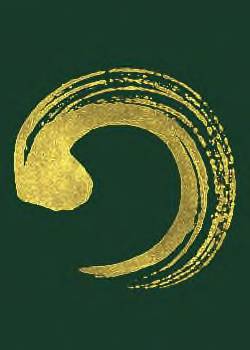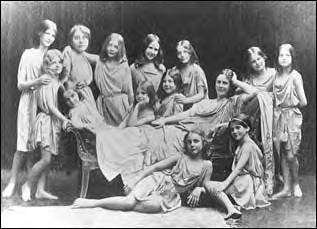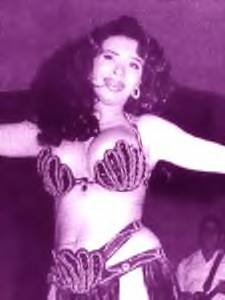|
|
 |
 |
|
WHEN YOU'VE GOT THE MESSAGE . . . |
 |
 |
|
Monique Monet |
 |
 |
|
(Originally published in Zaghareet Magazine) |
 |
 |
|
our development can appear obvious and elementary ten years down the road. To worship an outdated teaching simply because it
used to be so fulfilling is always a mistake. And so is a misguided and limiting sense of loyalty to a teacher you've outgrown. |
 |
 |
|
The student/teacher relationship isn't just a simple friendship. It's an interaction for the
transmission of knowledge: Usually for monetary compensation, the teacher provides information, skills, and insights that the student needs for her development. Value for value - - an honest exchange. |
|
|
 |
 |
|
But it is not uncommon, particularly in Middle Eastern Dance, to see this relationship degenerate into a
prolonged and unquestioned habit of comfortable stagnation and quiet guilt. It's important to remember, no one is ever so indebted to their teacher that they are obligated to sacrifice their own personal growth.
If you're friends with your teacher, that's great. And there is no reason at all that the friendship can't last. But if you're honestly not learning from her anymore you must face the reality
that the student/teacher portion of your relationship is over and it's time for a healthy change! Find a new teacher who can bring you to a higher level or better yet, if you already have a
good foundation in dance, become your own instructor and delve into the magic of your personal creativity. Today there are too many teachers, too many perpetual students - - and too few creative dancers!
Your teacher is there to pass on what information she can. But also she may make things too nice and comfortable for you, offering the cozy nest of the endless classroom. There is no escaping
the fact that time waits for no one. When you know in your heart you've learned all you can from her and, if you are serious about the art of dance, then it's time to push out of your comfort zone and face reality. When
you've got the message, hang up the phone; and move forward. What is true in microcosm is often true in macrocosm. The time has also arrived for us as a nation
of student dancers to claim our artistic maturity and, in ever more instances, hang up on that long distance phone connection. |
 |
 |
|
We in the West have for many years been receiving the message of dance from the Middle East. Lately it is
becoming increasingly obvious that we've served our time as novices eagerly striving to imitate our instructors. We've got the message, we've learned a lot, but now the time has come to celebrate our own unique
interpretations and creations in dance. Time to hang up the phone on the message that we are the eternal provincials. If we can be friends, different but equal, that would be wonderful. But the
student/teacher thing has run its course. |
|
|
 |
 |
|
In the United States, attitudes toward Middle Eastern Dance will be changing more in the next three years than they
have in the past thirty. Our dance form has evolved into a richly multi-faceted art offering a broad base for almost limitless dance creativity. Perhaps due to greater personal freedoms within our
culture, and our lack of (for better and for worse) binding traditions, and for a dozen other reasons, we in the West are taking Middle Eastern Dance in many new and exciting directions. |
|
 |
 |
|
Contrarily, dance in the Middle East is relatively stagnant, to a large extent a celebration
of traditionalism and uniformity. And what rebels do exist, battle the moral police for the right to wear skimpy costumes in Las Vegas style productions. |
|
|
 |
 |
|
The Middle Eastern dancers and musicians of the past have provided us with the skills and inspiration we
needed to progress into our own uniquely creative future. But we are now moving in our own directions, on an artistic quest in which they can be of little or no assistance. It is becoming
ever more apparent that we've arrived at a crossroads. And many of us in the West are taking the dance in directions its never gone before. That's not to imply that traditionalism is wrong, but that in the world of art
all paths are to be honored - - even ours. The innovative American Middle Eastern Dancer does not claim to be superior; but we do demand equality! No more provincial perennial student
mentality for us. Sure, we interpret the dance differently, from the Middle Easterners and from each other, but we all should be able to claim equality as dance artists. Sadly, there remain
those who reject our claim. I still hear native Middle Eastern performers, and their Western minions, repeat the tired old cliché, "American and European dancers can never attain the same level of performance as
women who were born and raised in the Middle East. Only those who grew up listening to the music can truly feel and understand its meaning. And only the Middle Eastern-born performer can properly express that feeling
through dance". |
 |
 |
|
Not only tiresome, but ridiculous! To imagine that all Middle Eastern women have a unique
superiority over all non-Middle Eastern women in performing Middle Eastern Dance is not only culturally prejudiced and artistically obscene, it's just plain incorrect! |
|
|
 |
 |
|
We are all endowed with certain gifts and natural inclinations which are totally irrelevant to our place
of birth. An Egyptian girl, born with absolutely no ear for music, can be raised among the finest dancers and musicians in Cairo and still end up a poor dancer. Just as a girl born and raised in Kansas, who happens to
have a natural affinity for music and movement, can grow up to be an inspired and magically gifted Middle Eastern Dance performer. I was once at a dance workshop in Hawaii where a supposed
expert had come from Lebanon to share her wisdom. She was a big name performer (but honestly a rather stiff and over-rehearsed dancer) and everyone couldn't praise her enough simply because of her reputation and because
she was from the Middle East. In the very back of the room, unnoticed by everyone in the crowded workshop, I saw a relative beginner who danced with striking, almost magical, fluidity and grace. Talking with her, I
learned she was from California, and of an unmusical family. Regardless, she had extraordinary potential. If she seriously continued in the dance she had the natural ability to become a truly great performer.
Bottom line: If the potential is not there, environment is practically irrelevant. God blesses us with certain abilities as She sees fit, and from there on it's a level playing field. |
|
|
 |
 |
|
Of course, we will always be indebted to the Middle East for founding our dance form, but
it's time for us to feel free to move on, into our many unique visions of the dance. The days in which we were ever ready to capitulate to the performers of the East are over. We
are growing in skill, |
|
 |
 |
|
creativity, and confidence. And with that development comes the realization that our adopted dance has
evolved into a unique and very real art form in and of itself. The musician from Beirut and the dancer from Cairo are no longer the final arbiters of right and wrong, proper and improper. |
 |
 |
 |
 |
|
It was of primary importance that we got the message. Learning from capable instructors
was necessary for growth and understanding. But when you find yourself feeling desperately stagnant; or feel something constantly clashing with your own artistic creativity (be it a message from the endless classroom,
or from the traditional Eastern patriarchy) it's time to hang up the phone; not with hostility or estrangement, but gently; and only so that we might listen more closely to the music and the magic within our own
hearts. |
|
|
All rights reserved |
|
|

























